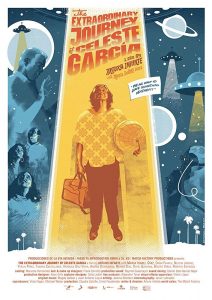‘Celeste Garcia’ explores how to get what we really want
“The Extraordinary Journey of Celeste Garcia” (“El viaje extraordinario de Celeste García”) (2018). Cast: María Isabel Díaz, Omar Franco, Néstor Jiménez, Yerlín Pérez, Tamara Castellanos, Veronica Diaz, Roberto Espinosa, Reinier Díaz, Andrea Doimeadios, Beatriz Viña. Director: Arturo Infante. Screenplay: Arturo Infante. Web site. Trailer.
Much of our life is spent just trying to figure out how it all works. This leaves us little time to devote to attaining what we really hope for out of it. And, even then, we may not get it right through many attempts at doing so. But, at some point, we just might hit upon the right formula, one that gives us the happiness and contentment we seek. Such an odyssey is the stuff of one woman’s pursuit to find a life that suits her as detailed in the offbeat new Cuban comedy, “The Extraordinary Journey of Celeste Garcia” (“El viaje extraordinario de Celeste García”).
Former school teacher Celeste Garcia (María Isabel Díaz) has led an often-difficult life, but the single, sixty-something retiree is now hoping her golden years in Havana will turn out better. She spends much of her time in the company of her Russian neighbor and volunteers as a docent at the local planetarium. Life’s admittedly far from perfect, but the spry senior enjoys a reasonably comfortable, albeit rather routine, existence, at least by present-day Cuban standards. But, while at home late one night, matters take a rather drastic and unexpected turn.
In the middle of a sound sleep, Celeste is awoken by an exceptionally bright light and strange sounds coming from her neighbor’s apartment. Celeste is mystified by these unusual happenings, so she decides to investigate. Upon entering the adjacent unit, however, she gets quite an eyeful; she finds herself in the company of several odd-looking individuals, beings who are unfamiliar and certainly not immediately recognizable as human. She doesn’t quite know what to make of this, but she doesn’t hang around to find out, quickly returning to her apartment and trying to ignore what she just witnessed.
The next day, she finds her apartment building crawling with authorities. She also learns that her neighbor is gone. But, rather than make waves, she essentially puts her head down and blinders on in an attempt to pay no attention to what’s going on. Before long, though, the truth of what’s happening is revealed through official TV news reports. It seems that Cuba has long been home to alien representatives from the planet Gryok, and the visitors now want to establish an exchange program with their earthly hosts, graciously extending an invitation to journey to their home world. And, with that revelation, Celeste strongly suspects her neighbor probably wasn’t Russian after all.
Demand for the exchange program is heavy, so the government establishes a lottery program to select its contingent of qualified applicants. Celeste’s friends and family encourage her to apply, believing that it would provide the lonely and unattached retiree with a fresh start, especially since it’s an opportunity that would feed her interest in astronomy. But Celeste says she has no desire to go, that she’s perfectly content to remain earthbound.

Former school teacher Celeste Garcia (María Isabel Díaz) hopes that an invitation by extraterrestrials to visit their home world will bring happiness to her lonely and unfulfilled life in the offbeat comedy, “The Extraordinary Journey of Celeste Garcia” (“El viaje extraordinario de Celeste García”). Photo courtesy of The Match Factory.
Despite her lack of interest in the exchange program, Celeste is nevertheless curious to find out what actually happened to her neighbor, so she decides to visit the office of the government agency overseeing the lottery to see if it has any information about her vanished friend’s whereabouts. While there, Celeste learns that her alleged Russian acquaintance had indeed been masquerading as a human for years, but that revelation pales in comparison to an even bigger surprise: It seems Celeste’s neighbor recommended her for the exchange program, making a reserved slot available to her with no need to go through the uncertainty of the lottery process.
So why did Celeste’s neighbor accord her such special treatment? Having been a teacher, Celeste is considered a superior being (for a human at least) and is looked upon as the kind of enlightened, uplifting individual that Gryokians (like her neighbor) believe make her an ideal candidate for inter-species exchange. The off-worlders are convinced they can learn as much from her as she can from them.
As word of the exchange program spreads, Cuba’s would-be space travelers grow more curious about the planet they hope to visit. Gryok, it seems, is quite an intriguing place – very earth-like in many ways but sufficiently different in others. For example, the distant world is home to animals not unlike those found on terra firma, but with some significant distinctions. Gryok’s chickens, for instance, are 20 feet tall (imagine the size of the eggs).
Having essentially been given a free pass to make the trip, Celeste is welcome to go if she wishes. And, given the number of lottery applicants, she’s thought of as quite the lucky soul. As she learns more about the faraway planet, her interest is piqued, fueled by the encouragement of her sister, Luisa (Beatriz Viña), and her son, Pedrito (Roberto Espinosa), who note how many others wish they were in her shoes. So, after some additional thought, Celeste comes to recognize that there’s really nothing holding her here, a realization that prompts her to accept the offer to journey into the cosmos.
To prepare for the trip, Celeste and the lucky lottery winners are sent to a special training camp housed in a cramped, abandoned, run-down school in the Cuban countryside. Along the way, Celeste meets an interesting array of fellow travelers, including a flamboyant retired musician, Hector (Néstor Jiménez), a feisty, mouthy middle-aged woman, Perlita (Yerlín Pérez), and an expectant young mother, Mirta (Tamara Castellanos). She also runs into a familiar face, Augusto (Omar Franco), her neighborhood butcher, a gentlemanly senior who, without fail, inconspicuously takes care of his favorite customer while quietly swooning for her from afar. And, to make sure everyone learns their preparatory lessons, the aspiring travelers are placed under the supervision of a despotic government apparatchik, Zobeida (Veronica Diaz), a civil servant on steroids who approaches her duties with the efficient, impersonal, perfunctory attitude of a drill sergeant.
As Celeste goes through her training, however, she begins to discover that this supposedly coveted opportunity may not be everything it’s cracked up to be. In addition to Zobeida’s routine bullying, incessant barking and relentless criticisms, the bureaucracy of getting processed, and a variety of other issues, Celeste grows increasingly disillusioned. The once-hopeful prospect for a new beginning starts serving up the same kind of disappointment and frustration that has characterized much of her life.
What’s more, not everything is above board, either. Wannabe travelers who haven’t qualified for the trip are camped out on the periphery of the training facility, looking for ways to scam themselves into a ticket. Such is the case with a young couple, Yunier (Reinier Díaz) and Malu (Andrea Doimeadios), who are on the run from the law for a crime of passion they committed, hopeful that the Gryokians haven’t yet established any extradition arrangements with their earthly colleagues. There’s a problem, though; while Yunier has been approved for the journey, Malu has not and is desperately looking for a way to get on board. They’ll do just about anything to get what they want, too, including taking advantage of the good graces of legitimate travelers – like Celeste.

Former school teacher Celeste Garcia (María Isabel Díaz, second from right) discusses her hopes for a new life on an alien planet to which she’s been invited with fellow travelers Hector (Néstor Jiménez, second from left), Perlita (Yerlín Pérez, right) and Mirta (Tamara Castellanos, left) in the offbeat new Cuban comedy, “The Extraordinary Journey of Celeste Garcia” (“El viaje extraordinario de Celeste García”). Photo courtesy of The Match Factory.
With the time of the rendezvous with the mother ship fast approaching, circumstances grow increasingly tense. So how will everything shake out? That remains to be seen as the confluence of the film’s various story threads come together to reveal an outcome that surprises everyone – both on and off the screen. A curious mix of heartache, contentment and unforeseen affiliations will leave everyone – even the aliens – scratching their heads at how things turn out. But, if an odyssey like this is genuinely meant to be a trek into the unknown, Celeste Garcia’s extraordinary journey truly lives up to every bit of its billing.
Creating the life we want for ourselves is, obviously, up to us. But many find that they fail at this, and they’re usually not sure why. In large part, though, it usually comes down to either not really knowing what we want or allowing ourselves to be unduly imprinted with the influences of others. Such impacts serve to shape our thoughts, beliefs and intents, the building blocks of the conscious creation process, the philosophy that maintains we use these metaphysical tools to manifest the reality we experience.
From this, it’s easy to see that, if we don’t have a good handle on our beliefs, we don’t have a good handle on the reality we materialize. Such is the case with Celeste; as dear and sweet as she is, she’s also something of a push-over, letting others around her determine what she should want rather than allowing herself to decide those matters for herself. But, when she discovers that what others want or recommend isn’t necessarily what she wants, she invariably runs into trouble. That’s something that has plagued her much of her life, and it’s reared its head once again when it comes to making a decision about whether to accept the Gryokians’ invitation (and hence the issues she experiences in the training camp).
To a certain extent, that’s not to be unexpected in a society, like Cuba, where officials make the decisions for all of its citizenry. Indeed, is it realistic to believe that individuals can learn to think for themselves when they’re constantly being told by authorities what they’re supposed to think? Such circumstances would appear to speak volumes for why Celeste finds herself in the situation that she’s in (and probably always has been).
In that regard, then, this film is as much a commentary on the state of Cuban politics and society as it is about the life of a woman seeking to find her way in the world (or on another planet). Those who quietly and compliantly always follow the rules, like Celeste, may not get into trouble, but they may also often find themselves less than satisfied with the results. Meanwhile, those who are willing to pursue what they actually want, like Yunier and Malu, frequently find that they must break the rules to reach their objectives, a potentially perilous course but one that at least allows them to think for themselves. Thus, in its own way, this picture quietly examines the roles of the group and the individual in society and how those influences factor into the manifestation of personal happiness and collective fulfillment (or lack thereof).

To a great degree, this is also an exploration into the question of personal power, namely, whether we successfully hold on to it or whether we capitulate and give it away. This, too, is determined by our beliefs, specifically when it comes to the value we place on retaining it. Intentionally choosing to maintain it may be a more difficult course, because doing so may fly in the face of what a powerful majority wants. However, because it also has the potential to provide us with eminently more happiness than surrendering it to others, it holds the promise of a more fulfilling existence. That’s something to bear in mind be it in our dealings with any type of authority figures, be they government officials, superior alien beings or even family members.
In the end, this is all a question of figuring out what we truly want for ourselves and then following through on it, first with our belief formation and then with the actions we take based on them. The “obvious” choices may be fine for some but not for others, and, if we truly want what we believe is best for ourselves, we must have the personal courage to stick to our guns. To do otherwise may place us in unsuitable circumstances, and there’s certainly nothing extraordinary about that.
Ironically, to find out what we really want, sometimes we have to experience disappointment first, largely because what lets us down is something we don’t really want in the first place, no matter how much we may have convinced ourselves that it is. But that can work to our advantage in that it can reach a breaking point, one that finally gets us to stop allowing ourselves to be talked into situations we don’t want and to start listening to our own true selves. That, in itself, can be quite an empowering experience, filling us with confidence and enabling us to direct our beliefs into the fulfillment of our own aspirations. The key, of course, is in finally coming to that realization and definitively acting upon it. It’s a life lesson Celeste could benefit from greatly – as long as she’ll have it.
This fun, delightful yet thought-provoking little comedy fills much bigger shoes than what one might think at first glance. This quirky but insightful offering features a host of colorful characters, offbeat incidents, absurdist humor and inventive sight gags, with ample symbolic sociopolitical commentary thrown in for good measure. There’s more going on than meets the eye in director Arturo Infante’s debut feature, so pay close attention, and don’t be quick to dismiss it as throwaway fluff.
Unfortunately, finding “Celeste Garcia” may take some doing, at least at the moment. This Cuban-German co-production has primarily been playing the film festival circuit, such as at the Chicago International Film Festival, where I first saw it. Check the picture’s web site or your local film festival’s web site for screenings.
An exceptional life is something most all of us seek, yet it often seems to elude us for reasons that are generally equally eluding. But that’s not to say it’s unattainable. Being truthful with ourselves about what we want and taking steps to achieve them are essential to see it realized. That can be quite an extraordinary journey in itself as we learn, usually through trial and tribulation, what it takes to reach that destination – no matter how far away or close it may be.
Copyright © 2018-19, by Brent Marchant. All rights reserved.




Leave A Comment